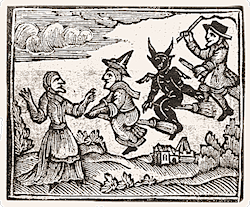Old besom
Q From Jane Tomlinson, Montreal: When I muttered old besom, when watching a local politician on the TV recently, was I unintentionally calling her a witch? Or was I merely taking a word beginning with b as a euphemism for female dog? Perhaps nobody else ever muttered old besom? It came up from the depths unexpectedly, I think a mild insult from my Lancashire childhood, a besom being a twig broom, very like a witch’s. I just wondered whether you might have any thoughts on the matter.
A I can assure you that old besom is a well-recorded insult that goes back many years, commonly with added expletives:
I’m a freeholder, with money in the bank; and now I won’t trust women no more! Silly old besom!
Rewards and Fairies, by Rudyard Kipling, 1910.
It isn’t yet obsolete but it’s definitely out of fashion, its fall in popularity partly due to the rarity of besoms in everyday urban life and perhaps also to the odd modern opprobrium attached to calling somebody old. It is still to be found in fiction:
It was unlikely that Rhea would have seen Susan’s face through the dense overgrowth of pig ivy even if the old besom had been looking in that direction, and she wasn’t.
Wizard and Glass, by Stephen King, 2003.
As you say, in standard English a besom is a broom made from twigs tied round a stick, a useful implement for sweeping up leaves and other loose stuff. This is a comparatively recent narrowing of the sense, since in Old English besom could be any type of broom, as its relatives still can in, for example, Dutch and German. In English, broom started its life much later to mean a sweeping implement made specifically from twigs of the plant called broom. Eventually it took over the general sense and pushed besom into the specific meaning it now has.
 A seventeenth-century woodcut of a witch
A seventeenth-century woodcut of a witch
and the devil on broomsticks
The Scottish National Dictionary says that in Scots a similar distinction has remained, with broom referring only to the plant, while besom means any sort of sweeping instrument.
Besom as a term of mild contempt for a woman, especially one who is awkward or surly, began to appear in Scots near the end of the eighteenth century and is also known in several dialects of northern England, including Lancashire. It’s an example of synecdoche, a woman who does household chores by wielding a besom becoming known by its name. It may also be that an influence was the association of witches with broomsticks, always pictured as besoms.
An early user was Sir Walter Scott:
“Ill’fa’ard, crazy, crack-brained gowk, that she is!” exclaimed the housekeeper, as she saw them depart, ‘to set up to be sae muckle better than ither folk, the ould besom, and to bring sae muckle distress on a douce quiet family!” If it hadna been that I am mair than half a gentlewoman by my station, I wad hae tried my ten nails in the wizen’d hide o’ her!”
Old Mortality, by Sir Walter Scott, 1816. Ill’fa’ard is “ill-favoured”; gowk is an awkward or foolish person, (though often as here a general term of abuse); a muckle (a variant of mickle) is a large amount; douce means sober or sedate.
